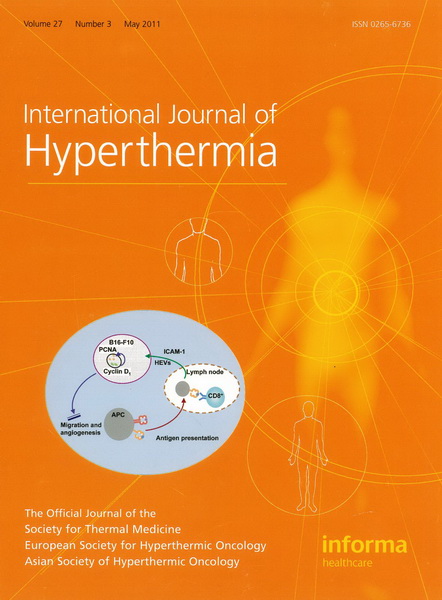
The paper entitled “Inhibition of B16 murine melanoma metastasis and enhancement of immunity by fever-range whole body hyperthermia” has been published as the cover article in International Journal of Hyperthermia.
Whole Body Hyperthermia (WBH) has been regarded as a promising alternative therapy to cure metastasis cancer with such advantages as lower cost, high security and reduced toxicity. Its wide clinical application, however, was restrained by insufficient corresponding knowledge and high-performance treatment equipment.
In order to clarify the mechanism of WBH, the research group headed by Dr. LIU Jing from the Technical Institute of Physics and Chemistry, Chinese Academy of Sciences and the Medical School of Tsinghua University did a collaborative research on mice injected with B16-F10 melanoma, establishing a microwave-based WBH approach for metastasis inhibition.
In the research, the best therapeutic effect was obtained when the mice were treated with WBH in combination with chemotherapy. It was examined that heat shock protein (HSP) expression increased in the hyperthermia groups and PCNA and cyclin D(1) reduced in the mice treated with WH alone or in combination with chemotherapy. In the hyperthermia groups, CD4+ /CD8+ decreased while the NK increased slightly. It demonstrated that WBH inhibited B16 tumour metastasis by inhibiting cell proliferation, neovascularisation and stimulating favorable immune responses.
The research not only proves that WBH treatment benefits therapy of metastasis cancers, but also gives new insight to the ongoing immunotherapy and chemotherapy. The paper entitled “Inhibition of B16 murine melanoma metastasis and enhancement of immunity by fever-range whole body hyperthermia” has been published as the cover article in International Journal of Hyperthermia (vol.27, No.3, pp. 275-285, 2011).
The research has received grants from the General Program of National Nature Science Foundation of China.

